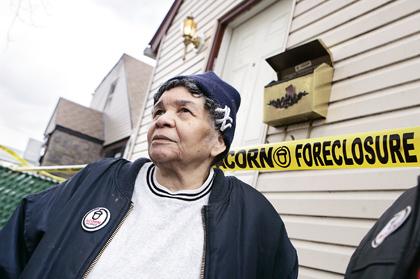By Ivan Pereira
Help may be on the way for beleaguered homeowners like Myrna Millington of Laurelton, but housing advocate group ACORN said voluntary actions can be taken right now by banks to halt unnecessary foreclosures even before President Barack Obama’s rescue plan works its way through the economy.
The nonprofit group staged a rally outside Millington’s foreclosed home at 130−99 222nd St. last Thursday to kick off a new campaign using peaceful tactics to keep people who have been evicted in their homes.
“They can put me in shackles, but I’m not going to leave my home,” said Millington, a 74−year−old widow, whose house was foreclosed in September.
Dozens of ACORN workers joined leaders, such as City Councilmen Thomas White (D−South Ozone Park), John Liu (D−Flushing) and David Weprin (D−Hollis) in an open call to lending institutions to voluntarily halt foreclosures for one year and renegotiate with borrowers.
Julie Boyd, chairwoman of ACORN’s Crown Heights chapter in Brooklyn, said such actions from the banks and lending institutions would complement Obama’s homeowners’ recovery package, scheduled to go into effect March 4, and could help as many as 5 million American homeowners.
“We will not rest until all financial services stop foreclosures on homes purchased with a subprime loan,” she said.
Although Millington and her husband paid off the mortgage to their one−family house, she took out two equity loans in 2000 to pay for $160,000 in renovations. The retiree refinanced her loans with mortgage company Option One two years ago and got a subprime mortgage, a loan that starts with a small interest rate but balloons rapidly over a relatively short period of time.
Millington said she was unable to make her weekly payments ,which have increased to $3,159 , and in the fall her home of 38 years was foreclosed, but she refused to leave. An auction was scheduled in January, but Acorn workers were able to postpone the sale and are working to renegotiate her payments on what has now ballooned into a $360,000 debt.
“I’m very worried,” she said.
Millington’s story is common to more than 5,000 Queens homeowners who had their homes foreclosed last year, according to ACORN. Southeast Queens neighborhoods, such as Laurelton, St. Albans and Springfield Gardens, lead the state in foreclosures, according to Community Board 12.
Under the president’s plan, qualified foreclosed homeowners will be able to refinance loans purchased through Fannie Mae, Freddie Mac and participating lenders.
Fannie Mae and Freddy Mac borrowers will be able to refinance if their loan is worth more than 80 percent of the home, while other borrowers can reduce their payments down to 38 percent of their income under Obama’s $275 billion plan.
Administrators of Neighborhood Housing Services of Jamaica, a nonprofit housing advocacy group, said Obama’s package was important because it focused on helping residents who may have been gulled into taking out the subprime loans, often granted to borrowers with weak credit histories.
“It has to go to ground zero and that’s where the homeowners are. They are really suffering,” said Cathy Minkens, the group’s executive director.
Weprin said the president’s action will save Millington and others, but he urged banks to take a stronger role in fixing the mess.
Citigroup, Bank of America, JP Morgan Chase and Morgan Stanley announced two weeks ago that they would voluntarily suspend their foreclosures until March in anticipation of Obama’s plan.
Weprin, chairman of the Council’s Finance Committee, said more lending institutions should follow suit so foreclosed homeowners could have a chance to find a way to stay in their homes.
“Everybody is being bailed out, but the people who aren’t being bailed out are the innocent homeowners here,” he said.
Reach reporter Ivan Pereira by e−mail at ipereira@timesledger.com or by phone at 718−229−0300, Ext. 146.































